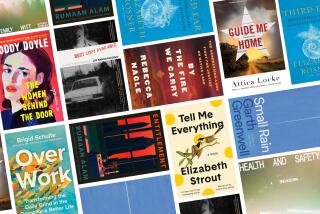Did you take part in NaNoWriMo? Lessons of National Novel Writing Month
National Novel Writing Month is over. Let National Novel Re-Writing Month begin!
Actually, there is no official, organized Revising-Your-Novel month. But if there were, and if everyone did the truly writerly thing and revised their novels obsessively, Iâm not sure thereâs an Internet big enough to contain all the words it would produce.
As it is, National Novel Writing Month (or NaNoWriMo for short) produced 3.3 billion words, according to its website, and probably more than 35,000 drafts of novels that are at least 50,000 words each (the final count wonât be in for a week or so).
Having finished a 50,000-word manuscript by Nov. 30 makes you a âwinnerâ as defined by NaNoWriMo, which earns you a golden halo (or is it a ring?) over your avatar on the NaNoWriMo website.
I took a stroll on the NaNoWriMo site to get a sense of what people had written. I thought Iâd make some comment on how âgoodâ or âbadâ the writing was, but after looking at several manuscript excerpts and reading through some of the NaNoWriMo forums, I realized that was an entirely inappropriate thing to do.
The purpose of NaNoWriMo, after all, isnât to produce polished work -- the kind of work that you could show, say, to an agent or people in a writing workshop. NaNoWriMoâs organizers admit as much on their website.
âDo not edit as you go,â they counsel. âEditing is for December and beyond. Think of November as an experiment in pure output. Even if itâs hard at first, leave ugly prose and poorly written passages on the page to be cleaned up later.â
Well, all that ugly prose and those poorly written passages are there now to see, if you peek at some of the excerpts. God bless the people who are brave enough to share their bad writing with the rest of us. My first drafts are pretty ugly too.
Over the last two weeks, for example, Iâve been obsessed with a single paragraph in the book Iâm writing. My first two or three attempts produced nothing but a sham of a paragraph, an embarrassment, a paragraph in name only. But it had the germ of a really good idea in it. It took six or seven attempts to create a single, 345-word paragraph that I felt good about, that didnât make me recoil in shame.
It goes without saying that paying that much attention to detail slowed me down a lot -- this month, while everyone on NaNoWriMo was zipping past the 10,000- and 25,000-word barrier, my book project advanced by a mere 8,000.
By the measure of NaNoWriMo, Iâm not a âwinner.â On the other hand, even reaching the goal of 50,000 words isnât really what NaNoWriMo is all about. That much is clear from reading discussions on what people learned about writing from NaNoWriMo.
âI learned that forcing myself to write when I donât think I have any ideas is a good way to come up with ideas,â a writer from Westminster said in a post on the NaNoWriMo forum âWhat Has NaNoWriMo Helped You Learn?â
Truer words have never been spoken, Westminster writer. Indeed, many of the lessons learned by NaNoWriMo writers sound like the lessons Iâve learned over the course of 25 years working as a professional.
âI ... learned that writing something that turns out terrible on the first draft doesnât mean that thatâs how all of the drafts will be,â said another writer who didnât give his or her location. âI learned that I can do more than I think I can -- it just takes time and effort.â
Couldnât have said it better myself.
â... I am very proud of myself,â said a writer in the Philippines. âI finished my novel before I turned 14, which was my goal since the very beginning. And now that NaNo is finished, I get to read again!â
A novel at 14! Wow! I couldnât finish a two-page term paper when I was 14.
âI learned that life gets in the way of what you want to achieve,â wrote a NaNoWriMo participant from Adelaide, Australia, who stopped at 18,000 words. âAround day 5, my family started arguing with each other and I had no time to write and when I did exile myself to my room, I was crying. (Not exactly the best mood for writing.)â
Yeah, life intrudes. It happens to all of us.
âI have learned that when you get stuck, even the most [ridiculous] idea might just get you out of it,â said a writer from Suffolk, England. âI have also learned, if in doubt, put in a death and some love and all in your novel will come out good.â
Good strategy, Suffolk writer. It worked wonders for Shakespeare too.
ALSO:
Oliver Burkemanâs âThe Antidoteâ rethinks positive thinking
âThree Cups of Teaâ co-author David Oliver Relin dead of suicide
Blinded by dollar signs? PW names E.L. James person of the year
More to Read
Sign up for our Book Club newsletter
Get the latest news, events and more from the Los Angeles Times Book Club, and help us get L.A. reading and talking.
You may occasionally receive promotional content from the Los Angeles Times.









